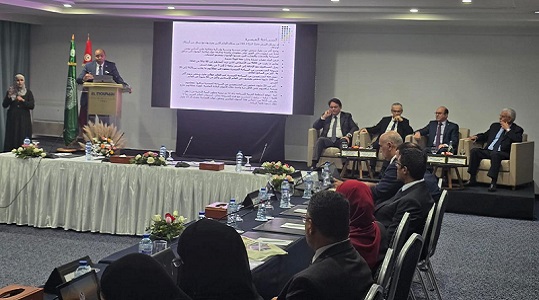The Union of Arab Chambers participated in the activities of the Arab Forum for Accessible Tourism for Persons with Disabilities, which was held in Tunis, the capital of the Republic of Tunisia, during the period 20-21 November 2024. With the participation and presence of His Excellency the Minister of Social Affairs of the Republic of Tunisia, Mr. Essam Al-Ahmar, His Excellency the Minister of Tourism of the Republic of Tunisia, Mr. Sofiane Taqia, His Excellency Minister Plenipotentiary Tarek Nabulsi, Director of the Department of Development and Social Policies at the League of Arab States, in addition to a crowd of ministers and government officials in Arab countries.
The Union of Arab Chambers had an intervention in the third working session entitled: "The role of the private sector to support accessible tourism", delivered by the Director General of the Tunisian Union of Industry, Commerce and Handicrafts, Mourad Meddeb, on behalf of the President of the Union of Arab Chambers, President of the Tunisian Union of Industry, Commerce, and Handicrafts, Mr. Samir Majoul.
In his intervention, Meddeb noted that when we talk about this type of tourism, we are not only talking about social responsibility but rather a strategic investment that contributes to advancing economic growth and achieving sustainable development. He stressed that the Arab private sector has huge potential to support and promote inclusive tourism. He considered that sustainable tourism depends on an accessible infrastructure that meets the needs of all tourists, including the elderly and people with disabilities. To this end, our investments must be directed towards the development of hotels, resorts, and tourism facilities to become more inclusive. The private sector can also play a pivotal role by harnessing technology to support tourism, as we live in an age of technology, where smartphone applications can provide voice guidance, easy booking services, and interactive maps of tourist destinations.
He believed that the success of inclusive tourism depends not only on infrastructure and technology but on the human element, hence the importance of training workers in the tourism sector to be fully aware of the needs of elderly and disabled visitors.
He stressed that in order for the private sector to succeed in achieving this vision, there must be support and encouragement from governments, as Arab governments must provide investment incentives to encourage and develop inclusive tourism such as tax exemptions, facilitating administrative procedures, and providing soft loans for innovative tourism projects. Thus, this cooperation between the public and private sectors can create an attractive environment for investment and lead to rapid and sustainable growth in this field. For example, recent reports suggest that the global market for accessible tourism is valued at around 200 elderly and disabled tourists spend nearly 30 percent more than regular tourists because of their special needs. This means that investment in this sector can generate significant economic returns.
In his intervention, Meddeb noted the importance of making innovation at the heart of our future plans. In this area, the private sector can support entrepreneurs who offer innovative ideas in the field of inclusive tourism, such as the development of smart applications or specialized services. Investing in these creative young people enhances our ability to offer an integrated tourism experience for all.
He pointed out that within the framework of our efforts as the Union of Arab Chambers, we will work to provide a platform for cooperation between all Arab countries, as we are fully aware that some countries may have made strides, while others are still at the beginning of their journey in the field of accessible tourism, and from here we in the Union are ready to facilitate the sharing of these successful experiences and the transfer of knowledge and expertise in order to ensure that all Arab countries will benefit from the best practices and technologies, thus contributing to enhancing the trend towards tourism available and accessible to all.
He concluded by saying that we believe that collective action and solidarity among Arab countries will lead to comprehensive success, making our region an attractive tourist destination that meets the needs of all visitors, as achieving the vision of tourism available to all is not just a distant dream, but a realistic goal that requires our cooperation and joint efforts. The Arab private sector has the capabilities and resources to be an active partner in achieving this vision, so it is necessary to work together to open tourism doors for all and ensure that travel is an enjoyable and safe experience for every human being regardless of his needs and challenges.
Source (Union of Arab Chambers)

